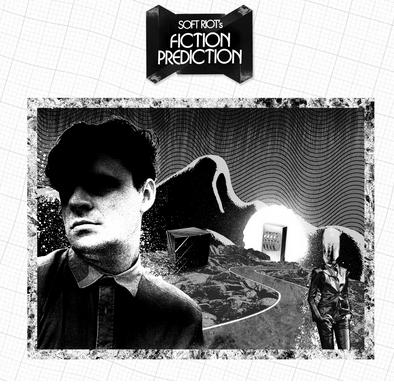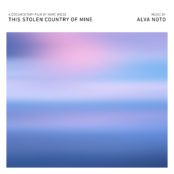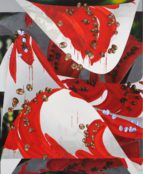[dropcap style=”font-size:100px; color:#992211;”]I[/dropcap]n the early 1980s one of the most subversive satirical British TV series was Not The Nine O’ Clock News.
Perhaps because of the numerous similarities between the polarised, crisis atmospheres of then and now, the series is once finding new relevance, although you have to wonder if any contemporary TV show would have the nerve to produce songs satirising the English attitude to Fascism (‘Oswald Moseley’) or mocking fundamentalists (‘The Ayatollah Song’).
The show’s songs mercilessly parodied the musical trends of the day including Heavy Metal, Ska, Punk and, perhaps, most memorably, New Romantic in ‘Nice Video, Shame About the Song’, a merciless but affectionate parody of everyone from Ashes to Ashes era Bowie to Spandau Ballet and Duran Duran. The times are strange indeed when this old classic seems so relevant to a review of a new electronic music release, yet such are the times.
As anyone who’s visited the more fashionable parts of East London of late will be aware, the necro-stalgic 1980s revival that seeped into consciousness around a decade ago together with the much shorter-lived electroclash tendency remains in full force, and goes to ever more desperate lengths to re-produce the familiar novelty of eighties-sounding music (often performed by people in their 20s and 30s).
[quote]superficial wallowing
in a dead style
by superficial artists
committed only
to repetition[/quote]
Personally, I love Cabaret Voltaire and much other 1980s electronic music, including many of the obscure gems that have been re-issued to satisfy the demand for material of this vintage. Yet what has to be remembered about these formerly-neglected and now-fetishised groups is that they certainly weren’t immune to mediocrity and kitsch, and as the decade wore on many were guilty of serious lapses of judgement (for instance SPK’s disastrous pop experiments).
However, many newer producers and listeners seem unwilling or unable to discriminate, to pick and choose from the 80s templates, rather than uncritically assimilate and reproduce them en masse and without qualification. After all, who’d want to spoil a party or risk being labelled a “hater” for insisting on the importance of selection and quality control?
Huge amounts of energy are spent trying to keep at bay or deny the awareness of those involved in these scenes that they aren’t old enough to have gone clubbing, released music or bought records in the 1980s. Some of them badly need to get over this and to acknowledge that however much 80s influenced music they produce or play, they aren’t in New Romantic London or Cold War West Berlin, but in Shoreditch three decades later, chasing their own tails and strip-mining the value and significance of what they claim to love so.
Some of the neo-80s music and fashion produced now is teetering on the brink of ‘Nice Video, Shame About the Song’ territory – except that they can’t quite manage to produce something as catchy, memorable, or stylish. To put it more clearly – this 1982 parody of New Romantic excess is better than many of the non-parodic, generally humourless (and often laughable) attempts to re-produce 1980s electronic templates.
So the main question that has to be answered when confronted by a neo-80s release is why? Is it adding anything to or subtly updating the old templates? Does it have any relevance to the present day or to the near future? (as much of the best 80s music did). Without a clear answer to these questions it’s hard to avoid the conclusion that it’s just a superficial wallowing in a dead style by superficial artists committed only to repetition without limits.
Soft Riot is a clever and even elegant name created by London-based Vancouver expatriate Jack Duckworth. Coming from an “art punk” background, he places more emphasis on lyrical content than many contemporary synth producers. The album does have serious and even dystopian sci-fi themes, although these are mostly at odds with the prevalent London neo-80s aesthetic and its horror of anything too serious.
In contrast to the more interesting parts of the arrangements, the vocal style often seems to designed to guard against and keep at bay anything too profound, although we have to bear in mind that this ultimately a pop release. So the question is whether this is a strategy of infiltration via pop or in reality a typical hipster strategy of superficilalisation – decorating the insignificant with faux significance.
‘Another Drone in Your Head’ sets the tone for much of what is to follow, featuring Cabaret Voltaire style-funk and great bass sounds, offset by an irritating vocal. Compare this with Ekoplekz, whose work certainly bears traces of (earlier) Cabaret Voltaire and who has even been remixed by Richard H. Kirk, but who is introducing new twists and mutations to old templates and is moving forwards rather than backwards.
More interesting is ‘Cinema Eyes’ which features a distinctive vocal and well-produced electronic elements. However, many people are going to be as preoccupied working out which 80s track it’s referencing as with listening to the sonic details.
‘There Just Isn’t Enough Time’ starts with this line sung as a descending major scale, followed by a response – “to take a walk, to read a book” etc. Lyrically it does summarise the (time) bankruptcy of our era but again the dancey chorus, and the trying-oh-so-hard-to-be-cool deadpan female vocal is dangerously close to the one on ‘Nice Video, Shame About the Song’.
Moving towards the dancefloor, ‘Cinema Eyes’ has a certain naïve charm, and an affectingly gauche keyboard sequence and chorus that does fit within the logic of the track. The J.G. Ballard-referencing ‘Terminal Love Song’ has some very interesting electronic sequences at the start, but even before the Spandau/Heaven 17-style chorus and its cheap synth sounds set in, the vocals seem too earnest or naïve.
Unfortunately, the longer it unfolds, the less persuasive it is, but it should make a nice anthem of superficiality for the Shoreditch set.
The opening beats and atmospheric chords of ‘Some Abstract Terror’ promise a lot and really whet the appetite for something (anything) better than the clumsy main section. ‘The Commuters’ – starts very promisingly with menacing bass, cold details and a whispered vocal. Predictably, the chorus brings more naïve keyboards and doesn’t seem to fit what’s gone before, but at least it’s less kitsch than some other tracks. Again, a colder and more minimal style would be more effective here.
‘Write Yourself Into the Void’ is not bad and at one point carries a trace of Monument-era Ultravox, but it’s hard not to think this is an extremely symbolic title for this school of music. There’s a slightly Numan-esque quality to the vocals on ‘A Spinnng Wheel’, coupled with dysfunctional synths in the style of ADULT, one of the most original electronic groups working with the old templates. This track works well in that it blends innovative and interesting sonic details and keeps the atmosphere fairly restrained and minimal throughout, avoiding the temptation of yet another big 80s style chorus.
‘You’ve Got to Use It’ – Is a really good track to start with, its electronics create an atmosphere reminiscent of Front 242‘s Body to Body, but the chorus is a sub-Cabaret Voltaire let-down, complete with gauche keyboard sequences. ‘Your Own Private Underworld’ features a faltering vocal and odd chord sequences in the style of Australian veterans Severed Heads. Severed Heads didn’t always practice quality control successfully, but here at least Soft Riot has chosen a strong template to follow. The track has a quirky charm and odd tension, especially as it fades. Here, the Soft Riot formula does work well.
The album rounds off with Extended Mix versions of ‘Cinema Eyes’ and ‘The Commuters’ – an explicitly and surely deliberately eighties nomenclature – reminding those old enough to remember (or to want to remember) of the explosion of 12” remixes and extended versions three decades ago, not all of which paid much attention to quality control. The virtue of these version is the chance to hear the electronics breathe, without being smothered by the vocals.
It would be wrong to describe this as a travesty and I’ve certainly heard far more derivative and conformist neo-80s releases. There are some interesting concepts and experiments here, but the moral of the story is that those who live uncritically by the 1980s creatively die by the 1980s, and too often the impression Soft Riot leaves is nice ideas, nice sounds… shame about some of the songs.
VOLAR37 / VOX016 Label(s) : Volar Records (US)
Other Voices (Europe) Release Date : June 262013
Format : Vinyl / CD / Cassette / Download
[button link=”http://volarrecords.bigcartel.com/” newwindow=”yes”] Volar Records[/button]




















